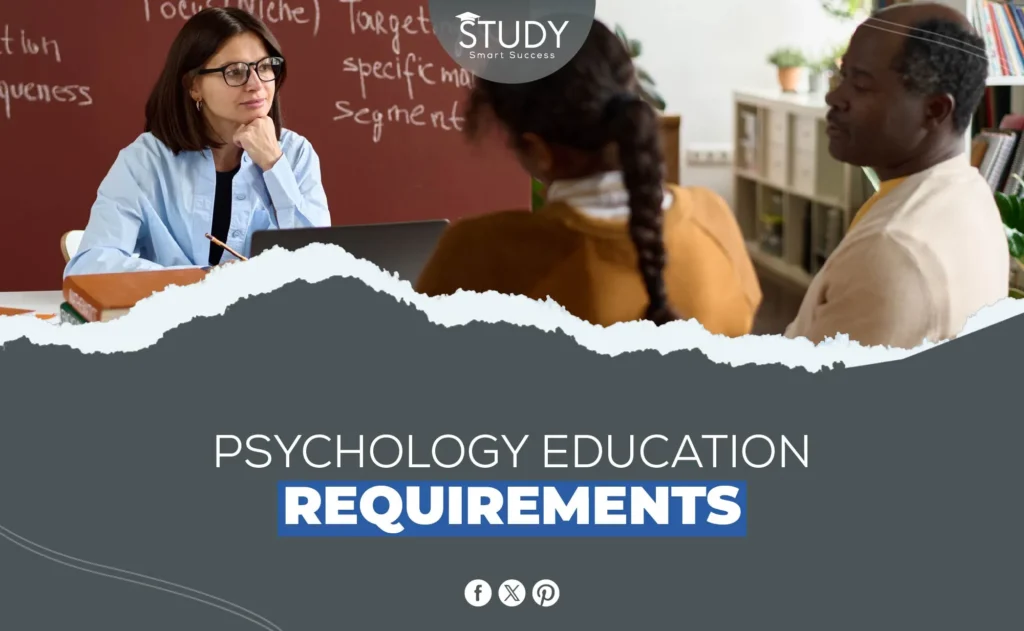Introduction
Setting the Stage: The Growing Interest in Psychology as a Career Choice
Recently, psychology has become one of the most popular job paths. People interested in the complex workings of the mind and behavior are drawn to this field. Many people want to become psychologists because they are interested in exploring the complicated side of human nature and want to make a real difference in people’s lives.
Importance of Understanding the Educational Journey for Aspiring Psychologists
To become a psychologist, you must grasp the educational requirements and pathways. Aspiring psychologists must navigate schooling, licensure, and specialty to achieve their career goals. This blog post explores the complex psychology education requirements. It highlights the essential steps and factors for people interested in this dynamic area.
The Basics Requirements of Education Psychology
Here are the top 3 main requirements of Education Psychology.
- The Foundation: Bachelor’s Degree in Psychology
- Advancing Your Knowledge: Graduate Studies in Psychology
- The Road to Licensure: Post-Graduate Requirements
Now, Define education psychology requirements step by step.
The Foundation: Bachelor’s Degree in Psychology
Overview of Undergraduate Psychology Programs
People who want to become psychologists usually start with a bachelor’s degree in psychology. Students who complete this essential study will understand psychology’s main ideas, theories, and methods well.
Core Coursework and Skill Development
Undergraduates study developmental, cognitive, social, and pathological psychology. They also learn critical thinking, research methods, and effective communication, which will help them succeed in psychology.
Importance of Gaining Research Experience and Internships
In addition to classroom instruction, internships and research experience shape budding psychologists’ academic and professional growth. Research projects under faculty mentors and internships allow students to apply theoretical knowledge in real-world contexts, improving abilities and understanding of psychological concepts.
Advancing Your Knowledge: Graduate Studies in Psychology
Master’s Degree vs. Doctoral Degree: Understanding the Options
Once a person has finished their undergraduate degree, they can get either a master’s or a doctoral degree in psychology, based on their career goals.
Exploring Specialization Areas within Psychology
Graduate courses allow prospective psychologists to specialize in clinical, counseling, industrial-organizational, or educational psychology. These career-specific programs provide pupils with advanced skills.
Prerequisites and Admission Requirements for Graduate Programs
Psychology graduate programs have strict prerequisites and entrance requirements, making admittance competitive. Through letters of recommendation, personal statements, and standardized test scores, prospective students must demonstrate academic achievement, relevant research experience, and a solid commitment to their area.
The Road to Licensure: Post-Graduate Requirements
Clinical Experience and Supervised Practice Hours
After graduate school, prospective psychologists gain clinical experience and supervised practice hours. Hands-on training is vital for building practical skills and competencies to deal with clients in varied therapeutic settings. Under licensed psychologists’ supervision, trainees get significant experience in evaluation, therapeutic methods, and ethical challenges, preparing them for professional practice.
Passing Licensure Exams: EP (Examination for Professional Practice in Psychology) and State-Specific Exams
Psychologists must pass standardized licensure examinations like the Association of State and Provincial Psychology Boards’ Examination for Professional Practice in Psychology (EPPP). Many states require candidates to complete state-specific tests on local psychology laws, regulations, and ethics. These demanding exams ensure that licensed psychologists fulfill the highest professional and ethical standards.
Continuing Education Requirements for Maintaining Licensure
Psychology is constantly changing; thus, continuing education is essential. Psychologists must complete continuing education requirements set by their licensing boards to stay licensed. Workshops, seminars, and advanced training programs help psychologists remain current on research, treatment methods, and best practices, ensuring they provide clients with high-quality, ethical psychological services.
Alternative Paths: Non-Traditional Routes to a Career in Psychology
Transitioning from Other Fields: Leveraging Transferable Skills
Transferable talents can help non-psychologists transition into psychology. Communication, problem-solving, empathy, and interpersonal skills are prized in psychology and used in counseling, social work, human resources, and education.
People who want to change careers can make themselves more attractive to employers for entry-level psychology jobs by highlighting the relevant experiences and skills they gained in their previous jobs. They can also go on to get more education and training to focus on their areas of interest.
Online Education Options and Their Validity in Psychology
The rise of online education platforms has democratized higher education by providing flexible and affordable alternatives to established schools. Accredited online psychology programs allow students to get undergraduate and graduate degrees, certificates, and continuing education from home.
The school and program’s accreditation status depends on whether online psychology education is valid. However, reputable online universities follow strict academic quality standards and offer programs that align with industry standards and licensing requirements.
Exploring Career Opportunities with a Bachelor’s Degree in Psychology
Contrary to popular opinion, a bachelor’s degree in psychology can lead to several careers outside clinical practice. Bachelor’s degree holders in psychology can work in human services, social work, mental health advocacy, research, marketing, and human resources.
In addition, they can look into jobs in educational institutions, non-profits, community groups, and government agencies where they can use their knowledge of psychology and human behavior to make reasonable changes in people’s lives and society.
Beyond Academia: Opportunities in Research, Teaching, and Applied Psychology
Research Positions in Academic and Non-Academic Settings
Psychological researchers have several chances to advance knowledge and understanding. Research assistants, laboratory managers, and postdoctoral fellows work with faculty on cutting-edge research projects and publish scientific papers.
Research institutes, government agencies, healthcare organizations, and corporate research departments also conduct applied research, program evaluation, and data analysis to address social issues and inform evidence-based interventions and policies.
Teaching Opportunities at Colleges, Universities, and High Schools
Academic and secondary education provide several opportunities for people who love teaching and mentoring. Psychologists can teach undergraduate and graduate courses in numerous psychology subfields and assist students in their educational and professional careers as tenure-track or adjunct professors.
Psychologists can teach students core principles and critical thinking skills by studying human behavior and mental processes at high schools, community colleges, and vocational schools.
Application of Psychology in Various Industries (Human Resources, Marketing, Healthcare, etc.)
Psychology principles are used across businesses, allowing psychologists to apply their knowledge and skills to complex issues. Psychologists use their knowledge of human behavior to improve organizational performance and employee well-being in talent acquisition, employee training and development, organizational development, and workplace diversity and inclusion.
Psychologists also do market research, plan advertising campaigns, and analyze consumer trends to improve brand loyalty and strategic decision-making. Psychologists work with interdisciplinary teams to provide complete mental health services, including assessment, diagnosis, psychotherapy, and behavioral intervention, encouraging lifelong health and wellness.
Challenges and Considerations Along the Way
Financial Considerations: Tuition Costs, Student Loans, and Funding Opportunities
Psychology school can be costly, including tuition, living expenses, and student loans. Applicants pursuing psychology degrees must carefully assess their financial situation and seek support through scholarships, grants, assistantships, and research stipends. Additionally, careful financial planning and budgeting can reduce stress and provide long-term financial security after employment.
Work-Life Balance during Intense Academic and Training Phases
The demands of academic and professional psychology training can make work-life balance difficult. Time management, self-care, and boundary setting are needed to balance courses, research, clinical practicum hours, and personal obligations. Self-care, supporting relationships, and help are vital for managing stress and preventing burnout during busy academic and training phases.
Mental Health and Self-Care for Psychology Students and Professionals
Students and professionals must prioritize mental health and self-care due to the emotional intensity of psychology. Self-care, like exercise, mindfulness meditation, hobbies, and social relationships, can boost resilience and mental health.
Supervision, consulting, and peer assistance can help with complex clinical cases, ethical difficulties, and professional progress. Taking care of one’s mental health allows psychologists to serve clients and contribute to the field.
Conclusion
Psychology education includes introductory undergraduate, advanced graduate, and post-graduate licensure. From theoretical knowledge and practical skills to clinical practice and research, each journey stage develops competent and compassionate psychologists who can make a positive difference in varied professional settings.
I urge aspiring psychologists to embark on this beautiful but challenging journey. Be determined and resilient in your pursuit of human psychology and behavior. Accept setbacks as learning opportunities and stay committed to using psychology to help others.
Remember the value of continuing education and professional growth in psychology. Keep up with new research, treatment methods, and ethical and legal norms. Continue your training, seek mentorship and supervision, and encourage intellectual curiosity to propel you as a lifelong learner and dedicated psychologist.
Finally, I applaud your decision to become a psychologist and wish you success and happiness. I hope you grow, have compassion, and are dedicated to serving others with honesty and quality.



